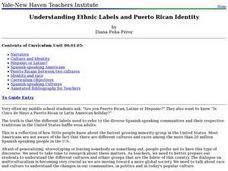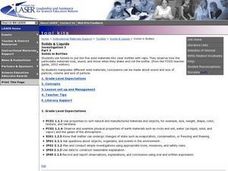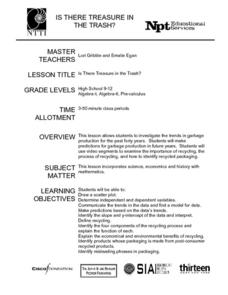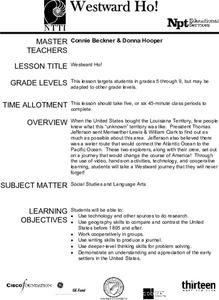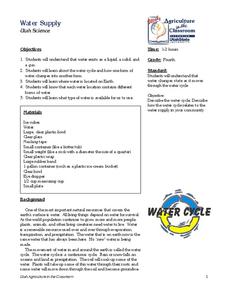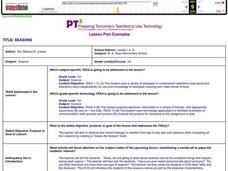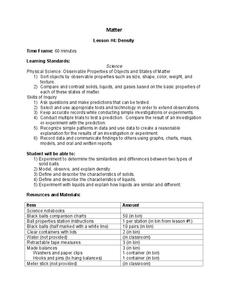Curated OER
What's The Scoop?
Students explore the properties of matter. In this cross curriculum three states of matter science lesson, students listen to the poem "Eighteen Flavors" by Shel Silverstein, and predict what will happen if listed ingredients are...
Curated OER
Understanding Ethnic Labels and Puerto Rican Identity
Students brainstorm a list of stereotypes associated with the Hispanic or Latin culture. In groups, they use the internet to research issues of importance to the Puerto Rican community. They focus on the cultures that speak Spanish and...
Curated OER
One Room School House Reading Lesson
Students explore schools during the Colonial period. In this American history lesson plan, students participate in a simulation of school days in Colonial America. Students visit a museum and use the schoolhouse as a setting for their...
Curated OER
Islam in America
Students examine the cultural and religious diversity within the United States. Using the differences, they discover they are a source of growth and change as well as conflict. They identify the changes that occur when new immigrants...
Curated OER
Solids in Bottles
Students use funnels to put the five solid materials into clear bottles with caps. They observe how the particulate materials look, sound, and move when they shake and roll the bottle. Finally, students write "sound and touch" poetry.
Concord Consortium
Molecular View of a Solid
Why are solids, well ... solid? Take a peek inside a solid substance with an easy-to-use interactive. Science sleuths examine the motion and position of the atoms that make up a solid before drawing conclusions from their observations.
Curated OER
Is there Treasure in Trash?
More people, more garbage! Young environmentalists graph population growth against the amount of garbage generated per year and find a linear model that best fits the data. This is an older resource that could benefit from more recent...
Curated OER
Figure of Speech
Examine the changing nature of language in the U.S. View and discuss excerpts from a PBS documentary with your class and then conduct Internet research, and complete a team project on the evolution of teen expressions.
John Hopkins University
Diets and Influence on Food Choice
From start to finish, this is a truly excellent lesson plan addressing the epidemic of diet-related disease in the United States. Learners begin with a reading excerpt of detailed information on trends in the American diet and the...
Curated OER
Determining the Density of a Liquid
Young scholars find the density of diet soda and regular soda. In this density lesson plan, students measure the mass of a graduated cylinder with 10 different volumes of each soda. They find the mass of the liquid alone and use the...
Curated OER
Westward Ho!
For any teacher of American History, The Lewis and Clark Expedition is a watershed event that should be shared with your students. This is a very good lesson on the Expedition, and the events that led up to it; including The Lousisiana...
Incredible Art
Historical Narrative Using Silhouettes
Connect art and history with a series of activities inspired by the work of contemporary artist, Kara Walker. After watching an Art 21 video about Walker and examining the images in a PowerPoint presentation, class members use...
Curated OER
Water Supply
Fourth graders complete three activities. In this water supply lesson, 4th graders learn that water can exist in different forms and watch a demonstration of each form. Students explore the water cycle and make a water cycle using the...
Virginia Department of Education
A Crystal Lab
Young chemists grow ionic crystals, metallic crystals, and supersaturated crystals in three different lab experiments. Observing these under a microscope allows pupils to compare the various structures.
Curated OER
Professor of Ice
In this environment experiment worksheet, high schoolers complete 3 experiments using ice. First they label each experiment and respond to the four questions given. Then students do the 3 experiments as stated, considering what the...
Curated OER
Seasons
First graders observe and record changes in weather from day to day and over seasons, while comparing all four seasons by creating a "Guess the Season" book.
Curated OER
Density
Learners predict when an object will float or sink based on comparison of density of the object to the density of the substance in which it is placed. The access a website and sketch the object in the first column of their table and then...
Curated OER
Cancer: A Crisis of the Cells
Pupils analyze cancer data represented in graphs and charts. They describe the changes in cell structure and function as the result of cancer. They also examine phenomenas that are believed to cause cancer.
Colorado State University
What Is a "Model"?
Model the transfer of energy during a typical 24-hour period. Young scholars use a game-like approach to learning the patterns of heat transfer through the day and night. Groups of four exchange different tokens as the energy transfers...
Curated OER
The Water We Drink
Third graders relate that the quality of their drinking water is subject to the condition of the environment and water found in streams and creeks in their community. They track the travel of a wad of paper from a student's desk to a...
University of California
Hot! Hot! Hot!
Calories are not tiny creatures that sew your clothes tighter every night, but what are they? A science activity, presented at multiple levels, has learners experiment with heat, heat transfer, and graph the function over time. It also...
Virginia Department of Education
Equilibrium and Le Chatelier’s Principle
The best part of learning about equilibrium is that nothing changes. Young chemists observe four demonstrations during this instructional activity: equilibrium in a saturated solution, equilibrium with an acid-base indicator, equilibrium...
Close Up Foundation
Teach the Vote
Why is voting important? A social studies unit presents a non-partisan approach to the importance of voting, to voting laws and procedures, and to resources that voters need to become informed voters.
Humanities Texas
Primary Source Worksheet: Excerpt from Reagan's Farewell Address
Here's a worksheet designed to help learners develop their skill reading primary source documents. The questions, based on an excerpt from Ronald Reagan's Farewell Address, encourages close reading and analysis.



